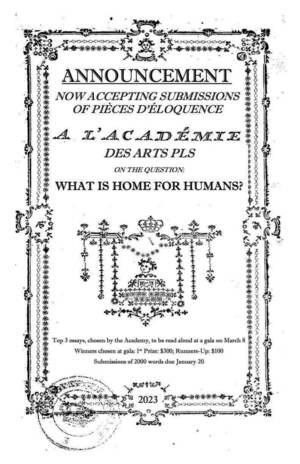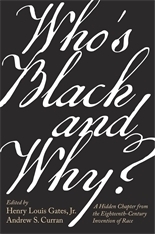L’Académie Prize Question

In the 17th-19th centuries, one form that popular and academic intellectual life took was the "prize question" issued by various academies across Europe. The first was sponsored by the French academy in 1670, and the earliest "prize questions" tended to take up traditional theological and moral topics. As the range of concerns entertained by intellectuals and average citizens in various organs of public discourse expanded, however, so did the topics addressed by the prize questions, which began to consider some of the most pressing contemporary problems of European society.
In 1750, Jean-Jacques Rousseau submitted his "Discourse on the Arts and Sciences" in response to the question posed by the Dijon Academy: “Has the restoration of the sciences and arts contributed to the purification of morals?” He won the contest, and it catapulted him to international fame. In the afterglow of his success, he penned an entry for the 1754 question: "What is the origin of inequality among men and is it authorized by natural law?” This time he lost, but his essay became the basis of his classic “Discourse on the Origin and Foundations of Inequality Among Men” published in 1755.
In 1837, Arthur Schopenhauer responded to the Royal Danish Academy's call for essays on the foundations of morality with his book On the Basis of Morality and lost. He had won a contest held the previous year by the Royal Norwegian Society of Sciences with an entry "On the Freedom of the Human Will." The fact that Rousseau and Schopenhauer lost these later contests, despite having previously won and achieved significant notoriety, is in part because the contests were open to all and judged anonymously, which meant that anyone could win solely on the basis of clarity and cogency of argument and elegance of prose, regardless of social and professional position or education.

Academy questions not only invited respondents to critically analyze current social practices, but they also sometimes solicited further support for these practices. One tragic example comes from the 1739 Bordeaux Academy of Sciences, which sought the best essay on the sources of "blackness." Recently collected in a volume edited by Henry Louis Gates, Jr. and Andrew Curran, Who's Black and Why?, the sixteen responses coming from all over Europe provided further justification for "the sale and enslavement of Black human beings." Prize questions, therefore, dealt with the most consequential matters of their day and ours.
Inspired by and extending this tradition, the Program of Liberal Studies is excited to announce its second annual prize question: How does nature end?
The faculty invite students in the Program to submit essays of no more than 2000 words on this question, which is intentionally open to interpretation and to a variety of answers from a diversity of disciplinary and experiential perspectives, to pls@nd.edu by January 22, 2023. Three finalists will be selected to read their essays aloud before the PLS community and a panel of faculty judges at a gala on March 6, 2024. Each essay will undergo blind review. The essays, which in the French Academies were called "pièces d’éloquence," will be judged not only for the clarity and cogency of their argument, but also for the beauty and pleasure of its expression. The winning author will be awarded $300 and publication in Programma, the PLS annual newsletter for alumni and friends of the Program. The two runners-up will each be awarded $100. And, of course, all three finalists will win the undivided attention of the most learned society at Notre Dame!
The Academy looks forward to receiving your submissions!